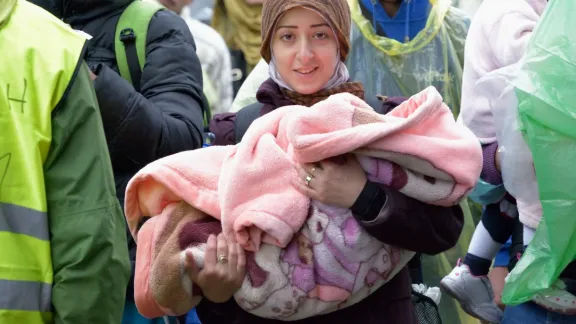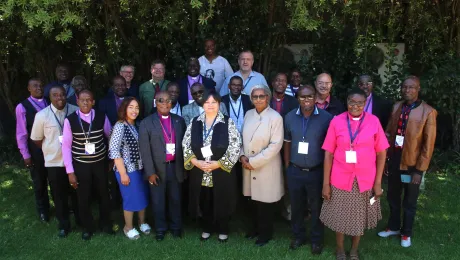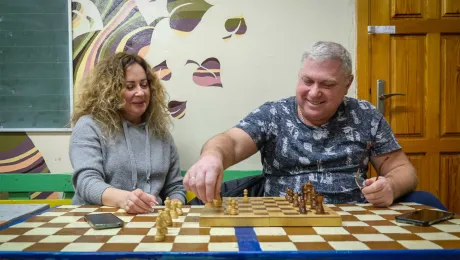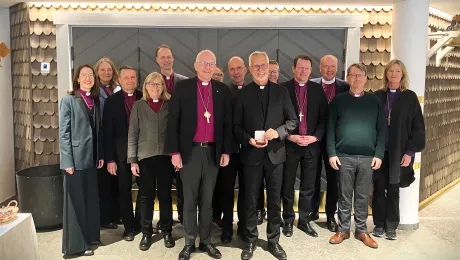
A refugee carrie a child near the Serbo-Croat border. Photo: Paul Jeffrey
LWF mission assesses situation at Serbo-Croatian border
(LWI) – A fact-finding mission by the Lutheran World Federation (LWF) and aid agency Diakonie Hungary is looking into ways of providing joint assistance to refugees at the Serbo-Croatian border where refugees continue to cross en route to Germany.
Attila Mészáros, secretary for refugee issues at Diakonie Hungary, and John Damerell, adviser to the LWF’s Department for World Service, were tasked with seeing how the two agencies could better support LWF member, the Evangelical Lutheran Church in Hungary.
Since the Hungarian government closed the border crossing at Röszke with Serbia, refugees have had to look for new routes.
From Serbia, some now try to reach Germany via Croatia, Slovenia and Austria. However, most choose the route via Croatia, Hungary and Austria, said Mészáros.
The Hungary border closure had only held up the flow of refugees for two days. Since then, some 3,000 to 7,000 refugees cross the border with Croatia every day, heading for Hungary, he said. Most were fleeing conflict in Syria, Iraq, Afghanistan, Somalia and Pakistan. The Hungarian government transports them in buses and trains provided free of charge from the Croatian border to Austria.
The team visited the towns where most border-crossings occur: Šid in Serbia and Tovarnik, on the Croatian side.
In Šid, Mészáros noted that a good relief system is in place, providing for the needs of thousands of refugees every day and guiding them on their way. “I had already been to Röszke and the Keleti railway station in Budapest. There was great confusion there and some of the police behaved very unpleasantly. In Šid, I thought: that’s another way of doing it.”
When refugees arrive at Šid, aid organizations , the United Nations High Commissioner for Refugees (UNHCR) and a Serbian ecumenical aid organization wait for them.
A pastor from the Slovak-speaking Protestant congregation in Šid told Mészáros that volunteers from the local Protestant and ecumenical congregations regularly work with refugees, as she does herself.
“Since we know that in autumn and winter more and more warm clothes, shoes and blankets will be needed, we are thinking about possibly providing support in this area,” Mészáros said. As it was difficult to transport supplies to Serbia, a non-European Union country, it was easier to transfer monetary donations, he said.
The LWF team also met representatives of Diakonie Bavaria, UNHCR, the Helsinki Committee and Menedék, the Hungarian Association for Migrants.
Besides the Hungarian church, other LWF member churches in Europe are directly assisting the refugees, and additional support and solidarity has been received from Lutheran churches across the world.
In statements and letters to the churches in Europe, both the LWF Council and General Secretary Rev. Dr Martin Junge have repeatedly underlined the need for governments to create refugee policy that lives up to the Christian duty to welcome strangers.
At the beginning of October, during a visit to Hungary, European LWF vice-presidents called for a dignified refugee policy in the region.
The LWF supports about 2 million refugees and internally displaced people worldwide, including Syrians who have fled to Jordan and Somalis at the Dadaab camp in Kenya.


